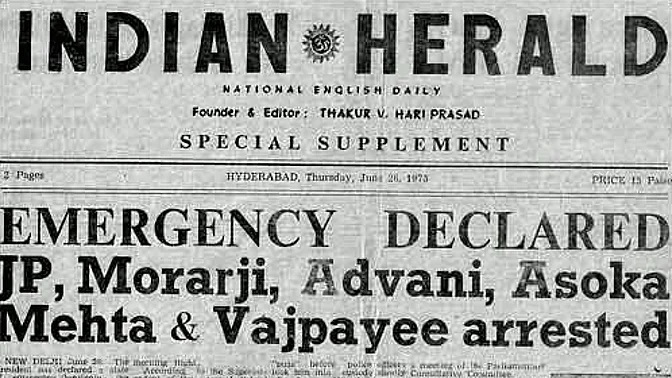I can still vividly recall the morning of June 26. I strolled into The Times of India office in Mumbai, where I was an assistant editor looking after the Sunday magazine, blissfully unaware of the overnight mass arrests in the country.
S P Singh, from Navbharat Times, who much later coined the memorable catch-line for his TV channel: ‘Yeh hai Aaj Tak, intezaar keejiye kal tak’, handed me a scrap of ticker tape which revealed that Indira’s government had imposed a national Emergency.
The First Stirrings of a Long Period of Unrest...
It was a moment of truth for us at the ToI. There was pandemonium that morning in the news room. I was instrumental with other colleagues in initiating an impromptu meet, where we drafted a memo opposing the censorship of the press which was almost the first thing – after arresting thousands of the ruling party’s opponents – that Mrs Gandhi did.
Word got to Khushwant Singh of the Illustrated Weekly on the floor above and he descended to address us. We had been running around like headless chickens, not knowing exactly what to do.
He introduced a note of caution, warning that any opposition could literally mean a matter of life or death. He cited that he had already lived a long life but warned all those of us who were far younger and also had our careers ahead of us.
While that stilled us into silence, I called Bernard Weinraub, The New York Times correspondent in Delhi, whom I knew, and passed on the memo. If I recall correctly, that made it to the front page of NYT.
The Many Means of Revolt of a Resilient Indian Press
A couple of days later, following another frenzied meet to declare our opposition to censorship at the Bombay Union of Journalists room (duly attended by plainclothesmen), General Manager Ram S Tarneja summoned me to his room and asked, somewhat circumspectly, whether I was fomenting indiscipline among my Sunday magazine staff.
I called his bluff by replying, matter-of-factly, that I was only exercising my constitutional right to freedom of expression. He decided to take this no further, though I must have remained in the top management’s scanner as a trouble-maker.
On a lighter note, soon after Emergency was declared, my friend Ashok Mahadevan, an editor in the Readers Digest, played a wonderful political prank on ToI. He placed an obituary:
O’Cracy, DEM, beloved husband of
T. Ruth, loving father of L I Bertie, brother of
Faith, Hope and Justicia, died on June 26.
Unknown to Mahadevan, the censors raided ToI the next morning and pulled out the item which would have appeared in what was known as the dak (post) editions for ‘upcountry’ towns.
On the fateful day, Sham Lal, true to his cautious disposition, decided to carry an innocuous first editorial (from memory, on some French political party wrangling). In outright defiance, his more independent peers, S Nanporia in The Statesman and S Mulgaokar in The Indian Express, carried blank spaces where the first edit should have been.
After Mrs Gandhi lost the national elections in 1977, Sham Lal did write that censorship ‘was hell’. She thought by going to the polls, she could legitimise her regime under the wholly erroneous assumption that all opposition was muzzled.
In those terrible months, I can even recall, since I had to submit a list of everything I was going to publish in the Sunday edition to Sham Lal for his own internal censorship, that he shot down a completely innocuous short story.
It was an enigmatic snapshot of a typical prosperous businessman’s house, which has a prayer room, opening out on to a courtyard. While the master of the house is trying to pray, he is disturbed by two dogs causing a commotion while mating outside.
To this day, I cannot for the life of me speculate what the provocation was for killing this story; perhaps it had to do with disturbing the normal order of things or a fear psychosis.
The Emergency: Not the Best of Times
Lal Krishna Advani, currently the senior-most Bharatiya Janata (then Jan Sangh) Party leader who, it must be recalled, began life as a journalist, said famously after Emergency ended, “The press was asked to bend, but it chose to crawl.”
The most celebrated and outspoken journalist to be jailed by the despotic Congress regime was Kuldip Nayar of Express. After his release, he wrote what was perhaps the country’s first best-selling contemporary non-fiction book, Between the Lines (it was the first, and perhaps only, book that many Indians then bought).
Closer home, my colleague Sundar Rajan, who made no secret of his antipathy to the repressive regime, wrote some condemnatory articles in foreign papers (he was also a correspondent of the New Statesman in London) under a nom de plume, and circulated critical articles from the foreign press and documents. He was arrested and imprisoned in Mumbai.
It was by no means the best of the Times, literally and metaphorically.
(The writer is a Mumbai-based senior journalist)
(At The Quint, we question everything. Play an active role in shaping our journalism by becoming a member today.)
